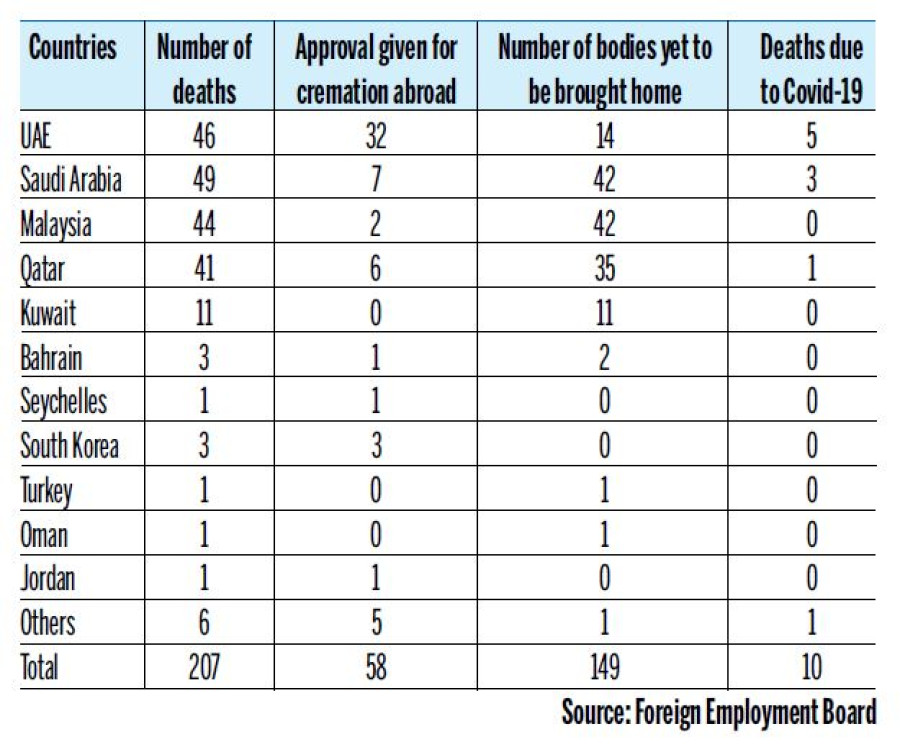National
Deceased migrants are being cremated overseas as lockdowns delay repatriation
Families have been left without option because of the uncertainty caused by the pandemic, officials say.
Chandan Kumar Mandal
Families of deceased Nepali migrant workers have started giving their approval for performing the final rites in the countries where they had been working owing to the lockdown, which has made it difficult to bring their bodies back home.
As the country is under a protracted lockdown with international flights suspended, several families have no option but to allow the cremation of their loved ones in the labour destinations.
According to the Foreign Employment Board, the government responsible for repatriating bodies and providing financial assistance to the aggrieved families, 58 families agreed for the cremation of their deceased family members abroad in the two months of the lockdown.
As per the data updated on Friday, final rites of 32 workers have been performed with family permission in the United Arab Emirates, seven in Saudi Arabia, six in Qatar, and three in South Korea, among other countries.
As the transportation of deceased workers has been halted due to the disruption of regular international flights, repatriation of a total of 207 Nepalis who died abroad has been directly affected.
“Some of these workers might have died even before the Covid-19 induced lockdown began in the country. However, [the process of] fetching dead bodies and handing them over to the grieving families has been obstructed,” said Rajan Prasad Shrestha, executive director with the Board. “Even if we have managed cremation of 58 bodies, 149 are still stranded.”
According to Shrestha, the Board either has to seek families’ permission for cremation in foreign land or the families have to wait until the lockdown is relaxed and international flights resume.
After several weeks of halt to the transportation, which caused a surge in the number of bodies to be brought home, the Board had started reaching out to the families and counselling them with an aim to manage the mortal remains of their members where they died.
“Considering the time it might take for bringing the bodies home, we started contacting families through our call centre and local level representatives to counsel families on allowing cremation abroad,” said Shrestha. “Once they agree, they give an affidavit, which is accepted and approved by the local level, the District Administration Office and then sent to Nepali missions abroad for performing the final rites.”
Recently, the Board had also announced an additional financial relief of Rs50,000 for families if they agree for last rites to be performed in the countries of their death. The decision was, however, criticised by many.
Shrestha believes an increasing number of families agreeing for the burial of migrant workers is a combined outcome of the several agencies encouraging families and the relief.
“The financial support has encouraged families. However, they still have choices—either wait for the resumption of flights, which is still uncertain, or allow authorities for cremation,” said Shrestha. “Two months of lockdown and a long wait in grief have made them give the permission.”
Another reason behind the families granting approval is that Nepali workers have died in countries reeling under Covid-19. At least 10 Nepalis have died due to Covid-19 infection, according to the Board.
Bringing bodies from those countries also carries the risk of coronavirus infection through the coffins used during transportation, said Shrestha.
“Although the bodies of workers who died from Covid-19 have been buried in those countries, people still must be scared and they don’t know how long they have to wait further,” said Shrestha.“Thus, they have been giving approval for final rites.”
After the families give permission, cremation teams perform the final rites in the presence of a representative of the Nepali mission and workers’ friends in the country.
“We have asked the Nepali missions abroad to inform us of the time and date of cremation immediately so that the families can go ahead with the remaining funeral rites,” said Shrestha.




 14.12°C Kathmandu
14.12°C Kathmandu














